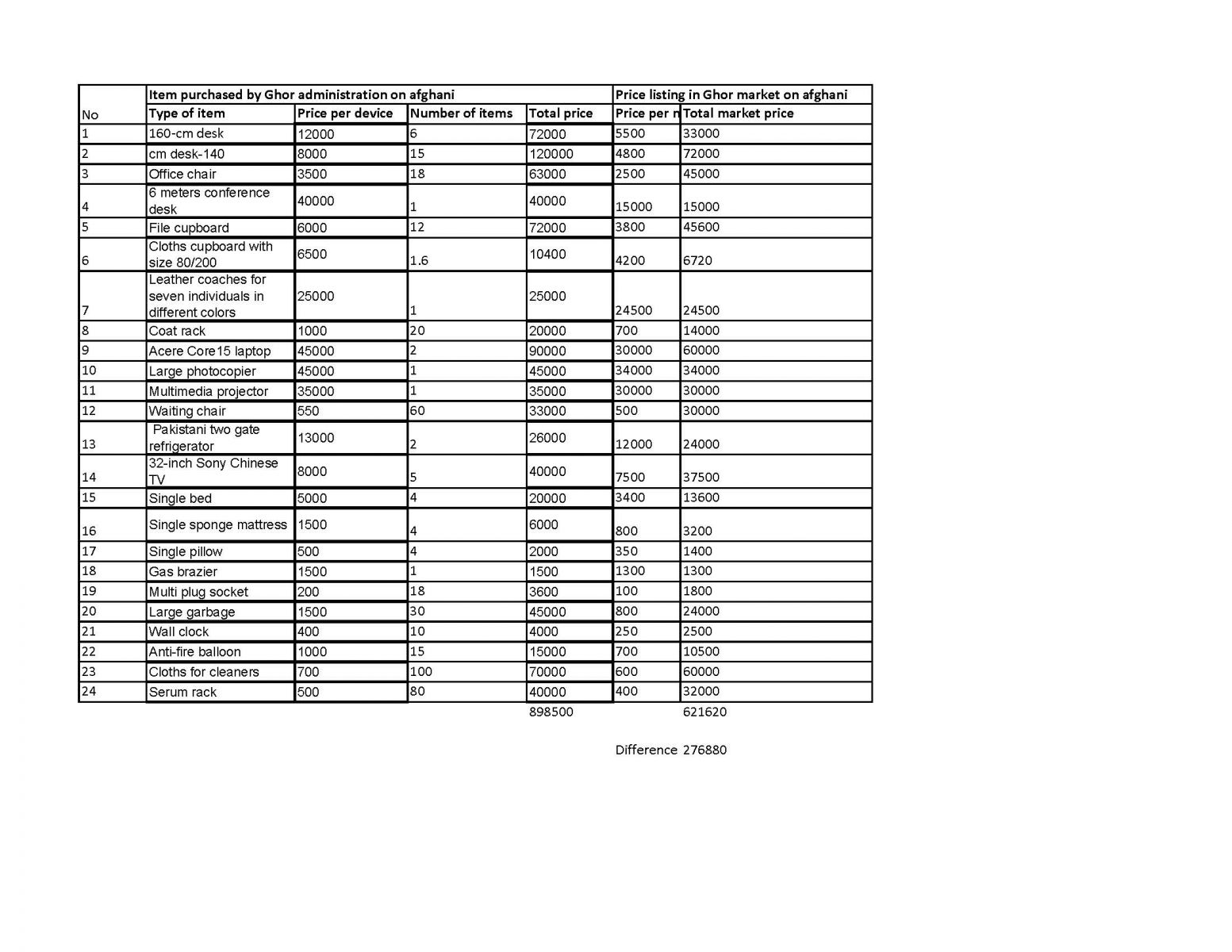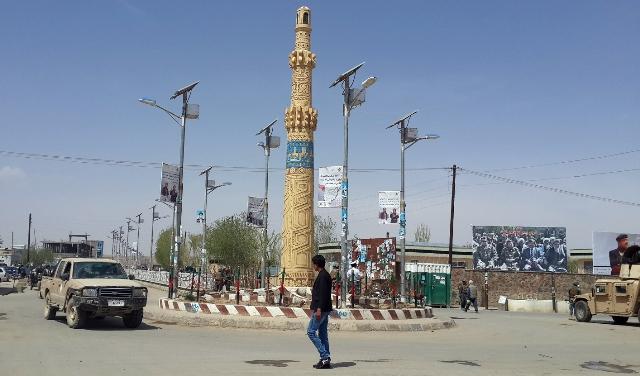KABUL province, Pajhwok has reliably learnt. The funds spent were meant for combating the coronavirus pandemic.
Documents reveal that nearly 200,000 afghanis were spent on a weeklong visit by a three-member delegation to Kabul. Each delegate spent about 9,500 afghanis on a daily basis. The expenses have come in for heavy flak from civil society activists in Ghor.
The government has allocated 20 million afghanis for fighting the coronavirus in Ghor province. According to the expenditure details unearthed by Pajhwok, the provincial administration has used 19981536 afghanis from the fund so far.
More than 3.436 million afghanis have been spent on salaries of the 80-bed Covid-19 hospital staff, over 1.292 million afghanis on purchasing equipment for the hospital, 300,000 afghanis paid to provincial hospital staff, 47,500 afghanis spent on sample transfers and 14,250 afghanis on buying locks for main entrances during the quarantine period.
About 199,230 afghanis were spent on sending delegation to Kabul, 35,900 afghanis on buying 35 types of medicine, 50,000 afghanis on providing livelihoods and equipment for Tolak district, nearly 471,000 afghanis on spraying the city, more than 725,000 afghanis on purchasing safety equipment for staff of Covid-19 hospital and 13.41 on purchasing medical equipment for the coronavirus hospital.
Higher rate than market price
Pajhwok Afghan News evaluated the purchase of 35 items by local administration for the Covid-19 Hospital. Pajhwok obtained prices of the items from the Haji Karim Dad Electronic Store, Haji Taj Gul Stanikzai Store, Noori Studio Digital Photograph, Photocopy and Stationary Store, Ferozkoh Wood and MDF Industry and Abdul Ghafar & Brothers carpet shop).
The prices suggest 24 types of items were purchased at a rate that is 31 percent higher than the market price. Based on Pajhwok’s evaluation, the result of which can be seen in the table below, the rates of some items are too high. As a whole, these items were purchased at a rate that is 277,000 afghanis higher than the market price.

Abdul Samad Ahmadi, finance and administrative director at the governor’s house, said the local administration had purchased the items based on transparent bidding in accordance with the law. He vehemently denied embezzlement in the fund.
“We don’t see a significant difference in prices. The rate of an item or two may be a bit higher. These things were not purchased in bulk. We have bought them after a transparent bidding. More than 10 firms were participated from a company that offered the lowest prices.”
Purchase of non-essential items
Among the 35 items purchased, there are some unnecessary things, such as 12 TV sets. Dr. Patuni Taishman, a medical specialist, acknowledged overall the coronavirus project had not been well-managed. In a situation, where Afghanistan was not economically viable, medicine and other essential materials should have been bought instead of TV sets and sofas, he opined.
He believed lack of proper management had paved the way for corruption. “Although, I’m in Kabul and don’t have complete information about Ghor, such irregularities, wherever they happen, indicate corruption.”
In Kabul, a doctor at the Mohammad Ali Jinnah Hospital for Covid-19 patients said the use of TV sets was not allowed in his hospital. TV sets were not only unnecessary, but they also disturbed patients and should not be used in hospitals, he argued.
But Samad Ahmadi said they bought the equipment and items in accordance with orders from the Public Health Department. The purchase of these items was not unnecessary because every office needed them. He insisted.
Asked why a 20-bed hospital had not been built in Tolak, he replied, district officials had been in contact with the former governor but they had not shared the issue with the governor.
Unnecessary expenses
Pajhwok’s findings show that of the 20 million afghanis allocated to Ghor for fighting the coronavirus. An amount of 50,000 afghanis set aside for Tolak district was not included in the fund.
Mohammad Hassan Hakimi, coordinator of civil society organisations, told Pajhwok other district should have been given part of this fund. However, he complained, balance was overlooked for unknown reasons in spending the fund.
Meanwhile, non-medical equipment was purchased from the fund meant for Tolak district. Ironically, the items remain unused, because a health centre for Covid-19 patients has not been established in the district so far.
Syed Mujtaba Hafizi, a public health official in Tolak district, said he had received 50,000 afghanis to fight the virus and the money had been spent on buying things like blankets, pillows, mattresses and solar panels under the guidance of former governor Ghulam Nasir Khaze.
He also acknowledged these items were not as important as medicine and medical devices. According to the former governor these items may be used in a 20-bed hospital in the district but the project is not yet functional due to lack of support from the provincial administration.
According to him, several residents of Tolak district have contracted the coronavirus and there is an urgent need for medical facilities to treat them.
Asked if it was possible to build a hospital with 20 million afghanis, he said: “Governor Ghulam Nasir Khaze told me to buy equipment and establish a clinic at Syed Abdullah Alawi School. Then suddenly the governor ordered equipment purchase before anything He also promised sending us the remaining money, but we have received nothing to build the clinic.”
Juma Gul Yaqubi, the director of public health, said some money had been donated to Tolak district by the anti-coronavirus committee to purchase equipment, given the surge in Covid-19 cases in the town.
Yaqubi added all districts had not been facilitated to fight the coronavirus, with the exception of a three-person team that examined patients, and the money allocated to Tolak had been spent on equipment purchase for the 20-bed hospital.
Abdul Samad Ahmadi, finance and administrative director at the governor’s house, said: “The coronavirus committee has allocated an amount of money for Tolak, where the number of positive cases has been on the rise. We wanted to equip the Covid-19 hospital in the Ferozkoh because of the high virus threat there.”
High cost of delegation’s visit
Expenses by the provincial committee for fighting the coronavirus show 199,230 afghanis were spent on the delegation’s visit to Kabul. Samad Ahmadi, three individuals (representatives of the governor’s house, customs and public health) expended 199,230 afghanis and they were paid the inflated travel allowance.
Under the relevant rules, a government official is entitled to receive 1,000 afghanis a day in travel expense and pocket money while travelling inside the country.
Hassan Hakimi, coordinator of the civil society organisations, said: “The money spent by the delegation shows they have spent a lot. The expenses are too high, even a person staying in a five-star hotel doesn’t spend this much. It shows corruption has been committed.”
He added the Ghor government and members of the coronavirus committee were not yet ready to face the public due to fund embezzlement.
Abdul Hamid Nateqi, a member of the provincial council, said: “Since its inception, the fund for combating Covid-19 has fuelled controversy in Ghor, including the equipment rate, purchase of items, medicines and travel of the delegation.
He said the spending of 199,000 afghanis by the delegation that traveled to Kabul was a topic of heated debate and one public representative in the coronavirus committee highlighted the issue. But, unfortunately no attention was paid to the remarks of the provincial council member.
“In my opinion, these resources have not been utilized and if the right policy is not framed and implemented, more money will disappear in future too,” he remarked.
Samad Ahmadi, finance and administrative director, said: “Previously, a three-member delegation was appointed, which together with the coronavirus committee had the authority to spend funds. Before the committee … we cannot say it is against the law because the spending has been need-based.”
This report has been produced by Pajhwok and financially supported by UNDP and Denmark.
sa/mud








GET IN TOUCH
NEWSLETTER
SUGGEST A STORY
PAJHWOK MOBILE APP